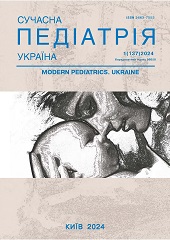Evaluation of Knowledge, Attitudes, and Practices towards Vaccination among Patients with Spina Bifida in Ukraine
DOI:
https://doi.org/10.15574/SP.2024.137.38Keywords:
spina bifida, vaccination, disability, knowledge, attitudes, practicesAbstract
Patients with spina bifida (SB) face an increased risk of infection due to frequent exposure to medical procedures and visits to healthcare centers, including rehabilitation centers. Infection can lead to complications in kidneys and urinary bladder, disrupt rehabilitation efforts, and reduce the quality of life.
Purpose - to assess the knowledge, attitudes, and practices related to vaccination among patients with SB and identify the reasons for the low vaccination rates in this group of children.
Materials and methods. An anonymous online survey was conducted among 56 parents of patients with SB. The questionnaire evaluates the knowledge (10 questions), attitudes and practices (4 questions) towards vaccination among parents of patients with SB in Ukraine. The results were analyzed using standard procedures with Statistica StatSoft 6.0 software package. Continuous variables were expressed as a mean and standard deviation (SD). The comparison of frequency parameters was performed using the Chi-square test. The differences between the parameters were statistically significant at p<0.05.
Results. Overall, parents demonstrated good knowledge about the role of vaccines in preventing serious diseases (61.7% gave correct answers), and the percentage of correct answers did not significantly differ between vaccinated, partially vaccinated, or unvaccinated groups of children. However, only 12.5% of SB patients were fully vaccinated and 51.8% were completely unvaccinated. Among the unvaccinated, the majority (55.2%) indicated non-recommendation by specialist doctors (neurosurgeon, neurologist, etc.) as the main reason. Primary care physicians were less likely to not recommend vaccination. Delayed vaccination was primarily due to fear of adverse reactions (40%). Despite low vaccination rates, parents generally had a positive attitude towards vaccination (only 5.4% against). Doctors remained the most influential source of information (63.4%).
Conclusions. A study suggests a need to enhance knowledge among healthcare professionals, increase public awareness, and provide education within patient groups to improve immunization coverage and protect SB children from preventable infectious diseases.
No conflict of interests was declared by the authors.
References
Boyarchuk OR, Koshmaniuk MV, Hlushko KT, Lovga MI, Savkiv DV. (2023). Spina bifida health issues of children in Ukraine. Modern Pediatrics. Ukraine. 2(130): 40-49. https://doi.org/10.15574/SP.2023.130.40
Boyarchuk OR, Koshmaniuk MV. (2023). The program of multidisciplinary online supportof children with spina bifida in Ukraine during the war. Child's Health. 18(5): 370-375. https://doi.org/10.22141/2224-0551.18.5.2023.1615
Boyarchuk OR, Mishchanchuk VA. (2020). Evaluation of influence factors on parents' adherence to the immunization. Modern Pediatrics. Ukraine. 5(109): 19-23. https://doi.org/10.15574/SP.2020.109.19
Gober J, Thomas SP, Gater DR. (2022). Pediatric Spina Bifida and Spinal Cord Injury. J Pers Med. 12(6): 985. https://doi.org/10.3390/jpm12060985; PMid:35743769 PMCid:PMC9225638
Iskandar BJ, Finnell RH. (2022). Spina Bifida. N Engl J Med. 387(5): 444-450. https://doi.org/10.1056/NEJMra2116032; PMid:35921452
O'Neill J, Newall F, Antolovich G, Lima S, Danchin M. (2020). Vaccination in people with disability: a review. Hum Vaccin Immunother. 16(1): 7-15. https://doi.org/10.1080/21645515.2019.1640556; PMid:31287773 PMCid:PMC7012164
Phillips LA, Burton JM, Evans SH. (2017). Spina Bifida Management. Curr Probl Pediatr Adolesc Health Care. 47(7): 173-177. https://doi.org/10.1016/j.cppeds.2017.06.007; PMid:28734746
Piccoliori G, Barbieri V, Wiedermann CJ, Engl A. (2023). Special roles of rural primary care and family medicine in improving vaccine hesitancy. Adv Clin Exp Med. 32(4): 401-406. https://doi.org/10.17219/acem/162349; PMid:37093088
Raddish M, Goldmann DA, Kaplan LC, Perrin JM. (1993). The immunization status of children with spina bifida. Am J Dis Child. 147(8): 849-853. https://doi.org/10.1001/archpedi.1993.02160320051018; PMid:8352219
Rangelova V, Kevorkyan A, Raycheva R, Amudzhiyan D, Aleksandrova M, Sariyan S. (2021). Knowledge, attitudes, and practices towards the influenza vaccine among adult population in Plovdiv, Bulgaria. Arch Balk Med Union. 56(3): 329-335. https://doi.org/10.31688/ABMU.2021.56.3.06
Shono A, Kondo M. (2015). Factors associated with seasonal influenza vaccine uptake among children in Japan. BMC Infect Dis. 15: 72. https://doi.org/10.1186/s12879-015-0821-3; PMid:25886607 PMCid:PMC4335773
Sullivan AM, Herdt M. (2022). Characteristics and first-year mortality, by lesion level, among infants with spina bifida in the New York State Birth Defects Registry, 2008-2017. Birth Defects Res. 114(2): 62-68. https://doi.org/10.1002/bdr2.1978; PMid:34953067
Tanabe T, Tagawa T, Arai H et al. (2011). Survey of Japanese pediatricians on vaccination of children with neurological disorders. Pediatr Int. 53(5): 626-629. https://doi.org/10.1111/j.1442-200X.2011.03339.x; PMid:21342359
Wei F, Mullooly JP, Goodman M et al. (2009). Identification and characteristics of vaccine refusers. BMC Pediatr. 9: 18. https://doi.org/10.1186/1471-2431-9-18; PMid:19261196 PMCid:PMC2667392
Wentz KR, Marcuse EK. (1990). Diphtheria-tetanus-pertussis vaccine and serious neurologic illness: an updated review of the epidemiologic evidence. Pediatrics. 87: 287-297.
WHO. (2024). Immunization data. Vaccination coverage. URL: https://immunizationdata.who.int/listing.html?topic=coverage&location=UKR.
Zerbo O, Modaressi S, Goddard K et al. (2022). Safety of measles and pertussis-containing vaccines in children with autism spectrum disorders. Vaccine. 40(18): 2568-2573. https://doi.org/10.1016/j.vaccine.2022.03.031; PMid:35315325
Downloads
Published
Issue
Section
License
Copyright (c) 2024 Modern pediatrics. Ukraine

This work is licensed under a Creative Commons Attribution-NonCommercial 4.0 International License.
The policy of the Journal “MODERN PEDIATRICS. UKRAINE” is compatible with the vast majority of funders' of open access and self-archiving policies. The journal provides immediate open access route being convinced that everyone – not only scientists - can benefit from research results, and publishes articles exclusively under open access distribution, with a Creative Commons Attribution-Noncommercial 4.0 international license (СС BY-NC).
Authors transfer the copyright to the Journal “MODERN PEDIATRICS. UKRAINE” when the manuscript is accepted for publication. Authors declare that this manuscript has not been published nor is under simultaneous consideration for publication elsewhere. After publication, the articles become freely available on-line to the public.
Readers have the right to use, distribute, and reproduce articles in any medium, provided the articles and the journal are properly cited.
The use of published materials for commercial purposes is strongly prohibited.

